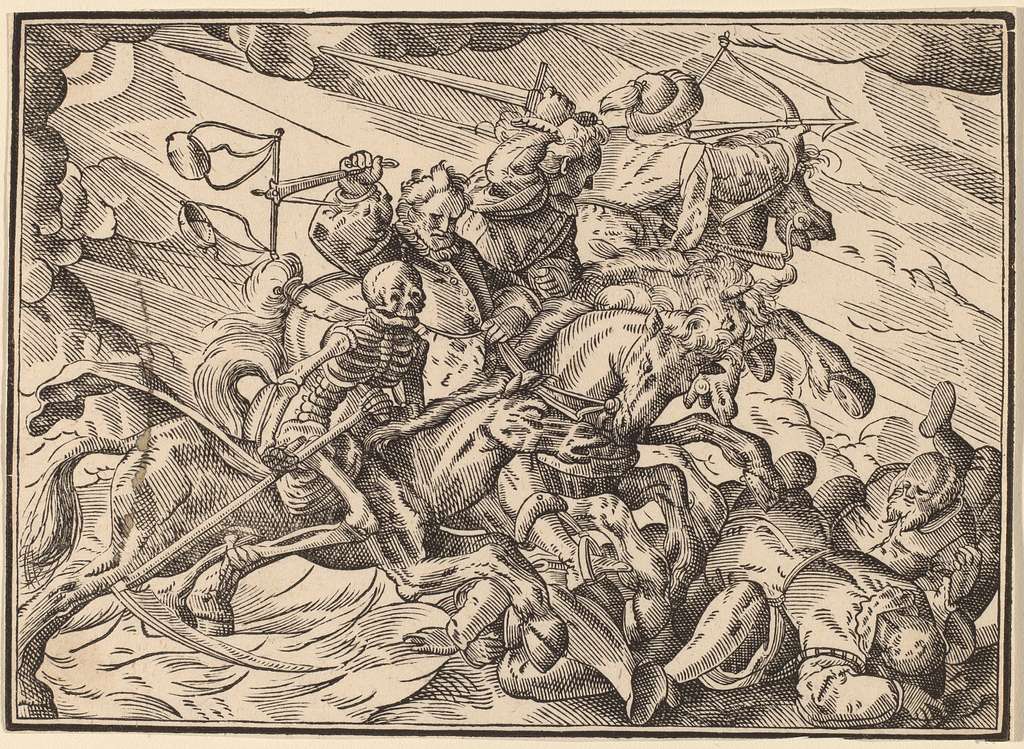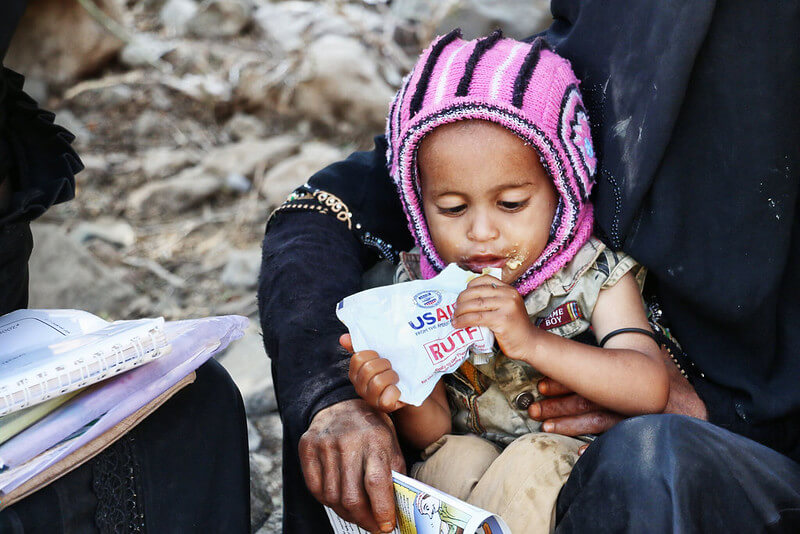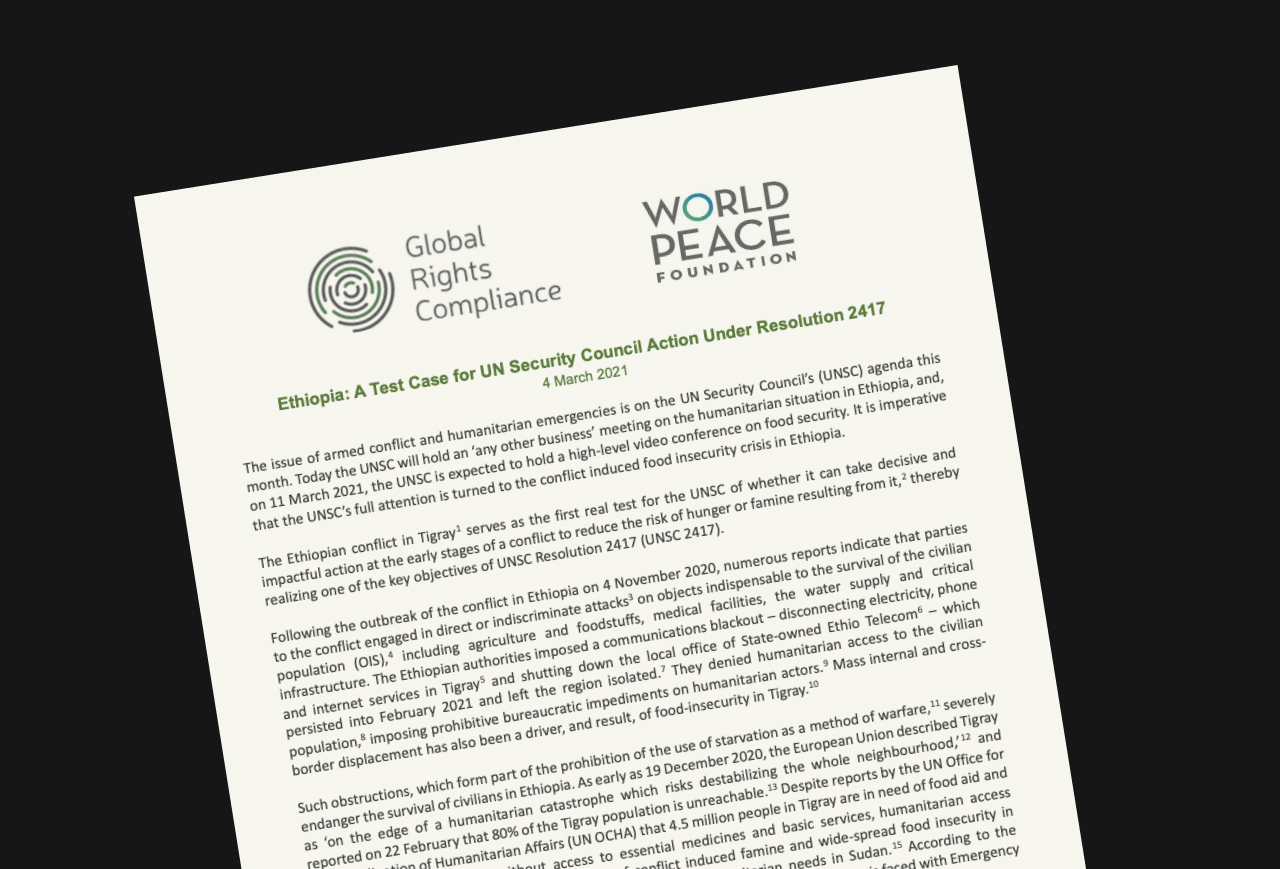Tomorrow, the World Food Program (WFP) receives the Nobel Peace Prize. It’s deserved. It will be a pared-down ceremony, held virtually. The format change is due to Covid-19, but it is appropriate for reasons beyond the pandemic. There isn’t much to celebrate right now.
The Norwegian Nobel Committee gave three reasons for why they are honoring WFP: combating hunger, bettering conditions for peace in conflict-affected areas and “acting as a driving force in efforts to prevent the use of hunger as a weapon of war and conflict.”
It’s that third reason that’s most crucial—and controversial.
As head of an international agency that needs the cooperation of governments for its funds and operations, the Director of the WFP, David Beasley, will need to choose his words carefully when he accepts the Peace Prize. He will probably make mention of how the global numbers of hungry people are increasing, how most of them are in conflict-affected areas, and how his agency struggles to reach them. He is likely to mention some of the recent progress in affirming that starvation as a weapon of war is prohibited under international law.
United Nations Security Council resolution 2417 of May 2018 reaffirms that “using starvation of civilians as a method of warfare may constitute a war crime.” It requires the Secretary General to “report swiftly to the Council when the risk of conflict-induced famine and wide-spread food insecurity in armed conflict contexts occurs.” An amendment to the Rome Statute of the International Criminal Court, adopted one year ago, extends the prohibition starvation of civilians to non-international armed conflicts. As lawyers pay closer attention to starvation crimes, the jurisprudence is being refined. There’s progress at the level of international norms—and the Nobel ceremony is an occasion to recognize that.
But if Mr. Beasley is unlikely to go one step further and name the leaders who are inflicting starvation on civilians even as he speaks. Beasley cannot risk offending governments that wield power over the hungry. Those who perpetrate starvation are by definition unscrupulous and inhumane, and they are perfectly capable of expelling aid agencies or restricting where aid workers can go and what they can say until they have completed their military goals. And the innocent will suffer. So we can expect that the Executive Director of the WFP will be discreet when it comes to identifying the men who make man-made famine.
The World Peace Foundation has also campaigned for accountability for mass starvation. We can be more candid. Let’s name some names—and list seven cases that the UN Secretary General should swiftly report to the Security Council.
In South Sudan, military forces associated with President Salva Kiir and members of his ruling coalition, as well as remnants of rebel groups are fighting and raiding civilian communities and reducing them to starvation. They’re also blocking humanitarian aid. The UN Human Rights Council has scrupulously
documented how this is a deliberate method of war—and how South Sudan, its neighbors and donors are dragging their feet on naming the culprits and bringing them to justice.
There is a mechanism for calling South Sudan’s starvation criminals to account—the hybrid court which is supposed to be set up as part of the Revitalized Agreement on the Resolution of the Conflict in South Sudan. This would be an appropriate place for prosecutions to begin.
Last week’s update on the food crisis in Yemen shows that virtually the entire country is in food crisis, much of it in emergency, with a warning that famine is possible if food supplies are cut off to the worst hit areas. The headline story is likely to be “no famine now”, using the definition of famine as “phase 5” of the United Nations’ Integrated Food Security Phase Classification system. But the fact that millions of Yemenis are in the next-worse categories (phase 3: “crisis” and phase 4: “emergency”) doesn’t meant that they’re okay. To the contrary, children and other vulnerable people are malnourished and dying in larger numbers, and even without a formal declaration of “famine” these numbers may add up to hundreds of thousands dead. The culprits: Crown Prince Muhammad bin Salman and other leaders of the Saudi-led coalition who recklessly pursued a war of hunger in the Arab world’s poorest country, and the Houthi authorities that have ruthlessly used food to cement their control.
The regime of Bashar al-Asad in Syria used starvation as one of its main weapons in trying to subjugate cities under opposition control. From the outset of the war, its strategy was “surrender or starve.” The opposition forces did so too, laying siege to government held-cities, and in divided cities such as Aleppo, each side tried to starve the other. Today, the legacy of those tactics, the ongoing war, the Covid-19 pandemic and the country’s economic collapse with massive inflation in the price of essentials, threatens famine. Mr. Beasley has himself warned about this in stark terms. The most guilty men: Asad and his lieutenants, along with their Iranian and Russian allies, but Islamic State and other insurgents have also committed starvation crimes.
In north-eastern Nigeria, the Boko Haram insurgents and the Nigerian army are jointly causing mass starvation, below the world’s radar. Direct military acts of starvation—destroying food and livelihoods, crowding people into garrison towns and camps—are compounded by systemic corruption and stealing aid intended for displaced people. The government has declared “victory” over the insurgents—a typical tactic intended to confuse international actors concerned with ending an ongoing war and protecting those affected, but the fact is that attacks continue and activists charge that as much as 85 percent of the Borno state, the epicenter of the insurgency, remains outside government control. Borno State Governor, Babagana Zulum, described the dire situation Nigerians in the northeast face saying, “On one side, they stay at home [where] they may be killed by hunger and starvation, on the other, they go out to their farmlands and risk getting killed by the insurgents.” The UN estimates that as many as 5.1 million people may be critically food insecure in the coming year, levels not seen for five years when parts of the northeast experienced famine. While alarm bells sound, starvation crimes continue.
In Venezuela, President Nicolás Maduro weaponized hunger as his economic policies plunged the country into poverty. Previously a wealthy country, Venezuela has plunged deep into turmoil and economic collapse. There is no armed conflict as such, but as the Maduro regime struggles to stay in power, with total disregard for the basic needs of its citizens, it is using its control over access to food, medicine and other objects indispensable for people to survive, as tools for its own survival. Maduro is utilizing an updated and digitized national identity card system—“Carnet de la Patria”—as an instrument of ensuring that regime loyalists are able to buy rationed food and access medicine, while depriving opposition supporters and those without official documentation of what they need to survive. Deprivation has also been intensified by U.S. sanctions, intended to drive the regime out of power. The number one culprit is Maduro himself.
In Myanmar, the campaign to force ethnic Rohingya from their homes is tantamount to starvation. The international legal definition of “starvation” is depriving people of “objects indispensable to their survival” which can include water, medicine, shelter or maternal care for young children—and the Myanmar army’s scorched earth sweep through Rohingya villages amounts exactly to that. A year ago, the head of government, Aung San Suu Kyi appeared at the International Court of Justice in the Hague to defend her country against accusations of genocide. For Suu Kyi, who won the Nobel Peace Prize in 1991, this was a steep fall from grace.
The seventh country on this list of shame is also led by a Nobel Laureate, Prime Minister Abiy Ahmed who won last year’s prize for turning the Ethiopian government’s antagonism with Eritrea into a partnership. Today, Ethiopia, which has a long history of famine, is on the brink of becoming the world’s most urgent humanitarian crisis. The month-old war in Tigray is being fought among a population plagued by food insecurity; the region was the epicenter of the infamous 1984-85 famine that was the occasion for the LiveAid outcry and global effort to feed the world’s hungry.
There are strong indications that all three belligerents in the Ethio-Eritrean war—the Ethiopian army and allied militias, the Eritrean army and the Tigray People’s Liberation Front (TPLF)—are responsible for starvation crimes, either deliberately or recklessly. With the current near blackout on information from the war zone, firm evidence isn’t yet available, but the urgency of the situation demands action without waiting for proof—especially if that proof arrives in the form of children dead from hunger and disease.
Tigray was already vulnerable before the war. The region has long been beset by chronic food insecurity, dependence on commercial supplies and relief aid brought in from elsewhere—over 600,000 people were receiving emergency food rations from WFP in October—and a locust infestation. These made it especially important that the warring parties fight in such a way as to preserve objects indispensable for the survival of the civilian population, and not only permit humanitarian access but take proactive steps to make it happen.
The Federal Army has officially been tasked with a rapid operation aimed at capturing the main towns and apprehending the leadership of the Tigray People’s Liberation Front. If that military objective could be achieved rapidly, it might be possible to avoid actions that cause massive displacement and hunger—but the longer the war goes on, the less likely that is likely to be. Air force and drone strikes have hit civilian targets, though it is not yet clear if patterns of attacks would be sufficient to determine war crimes including destroying objects indispensable for people’s survival. Artillery barrages have killed and injured civilians. One clear cause for alarm is reports of troops preventing people fleeing the violence from crossing into Sudan.
There is, however, little doubt that the militia from Amhara state have been looting, displacing people and killing. Even if starvation isn’t their main aim, that’s the obvious outcome.
The Federal Government’s agreement for “humanitarian corridors” is welcome but is at best a partial remedy, because the provision that humanitarian aid is directed only to areas under government control means de facto that those outside its control (or where it can block access( won’t get aid. P.M. Abiy at first refused to acknowledge that he was at war, and has since declared “victory”, but until his government faces the brute fact that it needs to negotiate a humanitarian truce or humanitarian access with the TPLF, it risks becoming party to a famine crime.
The TPLF is de facto the responsible authority for large parts of Tigray’s rural areas, which in addition to local people, currently also host many people who left the towns and cities when Eritrean and Federal forces moved in. Some of those evacuations appear to have been organized by the TPLF itself. To date we have heard nothing from the TPLF about its humanitarian plans. Its leadership undertook extensive military preparations prior to November but, it appears, made no plans for the needs of over 5 million people. Its leaders must be called to account for that reckless and inhumane (in)action.
Eritrea is the third belligerent. For the first weeks of the war, Eritrea’s leading role was an open secret—known to all who had followed the Horn of Africa, but not publicly acknowledged by any
government or international organization. Last week, a highly-respected exiled Eritrean general
provided an authoritative overview of the extent of the Eritrean Defense Forces’ operations. As well as major combat against the TPLF, there are reliable reports of Eritrean forces shelling hospitals, looting towns (including Adigrat and Mekelle) and overrunning refugee camps inside Tigray that until recently hosted 95,000 Eritreans who had escaped from their country seeking safety, causing a food crisis. President Isseyas Afewerki is a major suspect for starvation crimes committed against Ethiopian and Eritrean civilians.
These seven food crises—all of them marked by starvation crimes—mark a dreadful escalation of man-made hunger in the world today. The least that we can do is name the men who perpetrate starvation crimes.



